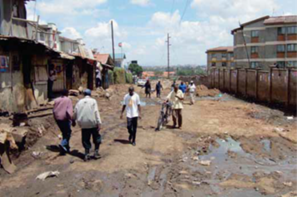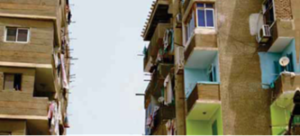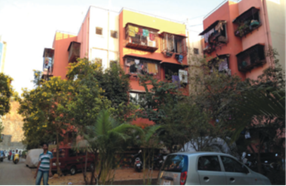Alternative financing models

ㅤ
- Figure a: The slum of Kibera in Nairobi, Kenya. Photo © UN-HABITAT/Claudio Acioly. Source: https://unhabitat.org/sites/default/files/download-manager-files/Affordable%20Land%20and%20Housing%20in%20Africa.pdf
Community-Led Infrastructure Finance Facility in Kenya
A notable innovative housing finance mechanism is the Community-Led Infrastructure Finance Facility (CLIFF), which provides loan finance for slum development projects implemented by established organisations of the urban poor and NGOs that support them. In addition to funding up-scaling and replication of projects, CLIFF also aims to influence policy and practice. In Kenya, CLIFF funds have been used to support six housing projects and one sanitation project in Nairobi.245 Around 2,000 slum households are expected to benefit from these projects. To date, over 70 houses have been constructed in the Huruma slum in Nairobi; and it is hoped that with support from CLIFF, this number will increase significantly
Vancouver’s strategy to provide land for social housing13
Due to its unique geography the City of Vancouver faces significant land supply constraints. This has resulted in it having the highest house prices in Canada and increasing demand for affordable housing. The City has 21,000 units of social housing and several land related policies to increase its social housing stock.
- Lease of City-owned land: Over one-third of all social housing in the City is on City-owned land. Projects primarily serve seniors and families with children. Other projects serve the disabled, low-income singles, aboriginals and youth. They are operated by non-profit housing societies and cooperatives using funds from senior governments.
- Purchase of sites: In 1981 the City Council made the purchase of privately-owned land for social housing a priority. Generally, the purchased land is leased to non-profit societies and co-operatives for 60 years at 75 per cent of market value. In recent years, the City has provided land leases at no cost for some projects.
- 20 per cent social housing requirement: Since 1988 the City has made it a requirement that major re-zonings of land for multi-household residential use include at least 20 per cent social housing. This policy encourages the creation of balanced communities and provides opportunities for low- and moderate-income households to live in comprehensively planned and usually well-located neighbourhoods.
- Affordable Housing Fund: Established in 1981 by City Council, the Fund provides grants for social housing projects developed on City-owned land.
By the end of 2003, City Council had approved over USD 40 million in subsidies from the Fund.
Egypt’s Informal Settlement Development Facility

- Figure b: Six-storey apartment buildings in Egypt. Photo © UN-HABITAT/Matthew French. Source: https://unhabitat.org/sites/default/files/download-manager-files/Affordable%20Land%20and%20Housing%20in%20Africa.pdf
In 2009, the Government of Egypt set up a dedicated facility to support informal settlement upgrading. The facility is under its direct control and run by an executive director and a board chaired by the Minister of Local Development, with representatives from six government departments and three civil society organisations, together with three experts. The Facility was established and capitalised with a government seed grant of EGP 500 million (USD 87.6 million), EGP 200 million (USD 35 million) in budget allocations and EGP 100 million (USD 17.5 million) in grants from USAID. The Facility has devised a national action plan, which includes the following components: (a) Knowledge management, including maps of all informal settlements; (b) a list of programmes and projects to be implemented; (c) identifying the technical assistance and capacity-building to be extended to those local authorities implementing projects; (d) partnerships with stakeholders, including private sector entities; (e) scheduling of projects; and (f) a priority to land-based finance to generate revenue.
The facility has requested a government allocation of land to be used as an asset in the new towns to recapitalise and speed up disbursements. In addition, the Facility has requested the following nearly 75,000 subsidised housing units for priority target groups requiring relocation, namely households living in environmentally hazardous areas and households living in shacks and structurally unsound buildings.
As it stands, Egypt’s Informal Settlement Development Facility faces two major challenges. Firstly, creating a legal framework that can accommodate the complex land transactions required for land-based financing of upgrading projects. Secondly, ensuring repayment by borrowing local authorities to ensure the continuity an expansion of the Facility and its programmes. Nevertheless, it is a positive step forward to improve the living conditions of the most vulnerable living in Egyptian informal settlements.
Cross-subsidization for the construction of affordable housing: the case of the Nagari Nivara Parishad NGO, India

- Figure c: Nagari. Photo: RCHI MIT1. Source: https://publications.iadb.org/publications/spanish/document/Vivienda_Qu%C3%A9_viene_de_pensar_la_unidad_a_construir_la_ciudad.pdf
This project emerged from a public protest by 4,000 citizens in Mumbai in 1981. Most of them were low-income workers demanding a land grant to build affordable housing. Once the government awarded them the land, Nagari Nivara Parishad (NNP) organized the community to create a fund to pay the government the cost of the subsidized land.
The NGO organized the community, created a fund to pay the government for the subsidized land, and applied for a loan to start its development by mortgaging part of the residential plots. From the construction and sale of the first units, they injected credit into the project and, thus, developed the rest of the housing complexes. The undertaking was supported by the management of the sale and demonstrated the potential of self-financed housing even in low-income population contexts with the profits from transactions at market price.
More information:
- UN-Habitat’s Affordable Land and Housing in Africa. Source: https://unhabitat.org/sites/default/files/download-manager-files/Affordable%20Land%20and%20Housing%20in%20Africa.pdf
- UN-Habitat’s Affordable Land and Housing in Europe and North America Report. Source: City of Vancouver, Housing Centre, 2007; https://unhabitat.org/sites/default/files/download-manager-files/Affordable%20Land%20and%20Housing%20in%20Europe%20and%20North%20America.pdf
- UN-Habitat’s Affordable Land and Housing in Africa Report. Source: UN-HABITAT, 2010. Source: https://unhabitat.org/sites/default/files/download-manager-files/Affordable%20Land%20and%20Housing%20in%20Africa.pdf
- BID’s Report Vivienda ¿Qué viene?: de pensar la unidad a construir la ciudad. Source: https://publications.iadb.org/publications/spanish/document/Vivienda_Qu%C3%A9_viene_de_pensar_la_unidad_a_construir_la_ciudad.pdf
